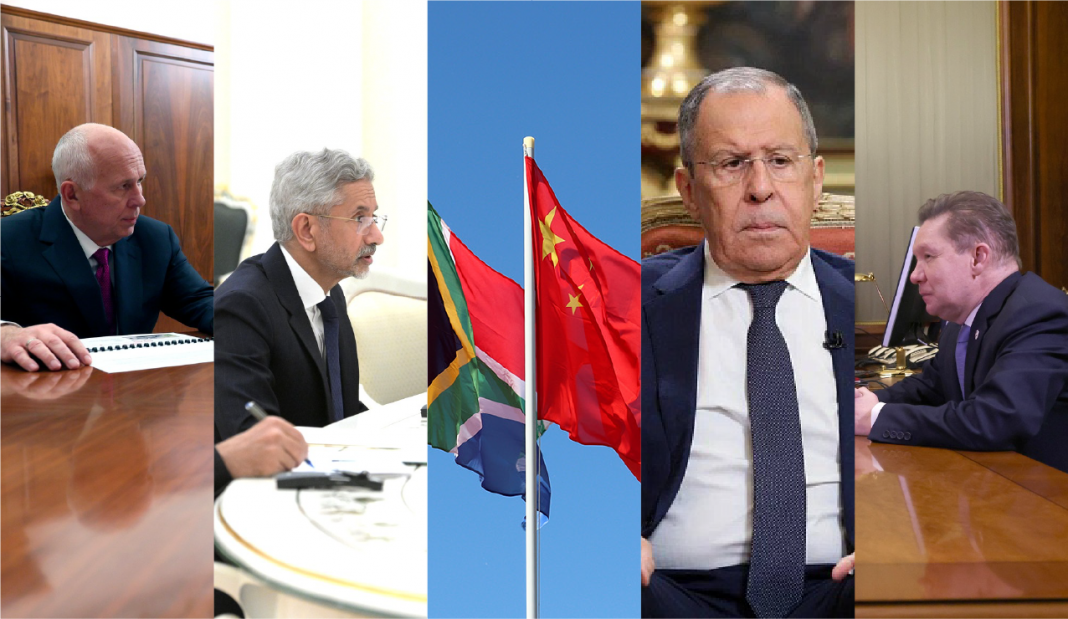This report describes the key events that significantly impacted Russia’s political, economic, and social processes.
Based on the results of the past week, we specify the following trends:
- Putin demonstrates that he controls the Armed Forces and handles the situation. As Ascolta previously reported, military issues will become one of the most defining issues during Putin’s presidential campaign in 2024. The meeting with Shoigu is rather an element of this campaign, as are the trips to the headquarters of the Southern Military District in Rostov-on-Don. The essence of the meetings is not particularly important – the “picture” is essential. In addition, the meeting on the frigate “Admiral Golovko” should become a signal to the West, where voices were heard about the need to transform the Baltic Sea into an internal NATO sea: Russia is not going to leave the Baltic and is ready for confrontation at sea.
- The shelling of Belgorod raises many questions. There is still no real evidence that this attack was the work of Ukraine. It did not provide any strategic advantages and was not aimed at military targets. In many ways, there is a signature of “provocativeness” that we observed in 1999–2001 during the bombings of houses in the Russian Federation (the explosions themselves preceded the Second Chechen War). It is expected that such actions will not be isolated, and before the elections in Russia, from time to time, there will be reminders of the “atrocities of the terrorist regime in Kyiv” and that the [so-called] “SMO must be carried to the end.”
- In 2024, Russia will receive the chairmanship of two important international organisations, BRICS and the CIS. For Putin, this is an excellent opportunity to break the established stereotype that Russia is in international isolation and that he does not shake hands as a leader. It can be assumed that the primary goal of the CIS chairmanship will be an attempt to demonstrate Russia’s influence on the post-Soviet space. First of all, the states of Central Asia. As for BRICS, Russia’s chairmanship in this organisation will be aimed at strengthening its position as one of the key players in the “Global South,” which is increasingly emerging as a counterweight to the Western system of geopolitical coordinates.
This report highlights the following topics that were most relevant for Russia during 25 December – 01 January:
1. Meeting of Vladimir Putin and Sergei Shoigu;
2. Meeting of the Supreme Eurasian Economic Council;
3. Informal meeting of the CIS member states’ heads;
4. Meeting of Vladimir Putin and Alexey Miller;
5. Meeting of the State Council of the Russian Federation;
6. Meeting with the Minister of External Affairs of India Subramaniam Jaishankar;
7. Meeting of Vladimir Putin and Sergei Chemezov;
8. Interview with Sergei Lavrov for Russian media;
9. Shelling of Belgorod;
10. New Year’s greetings from Vladimir Putin;
11. Vladimir Putin’s visit to a military hospital and meeting with military personnel;
12. The beginning of Russia’s chairmanship in some international organisations.
This Content Is Only For Subscribers
- Meeting of Vladimir Putin and Sergei Shoigu
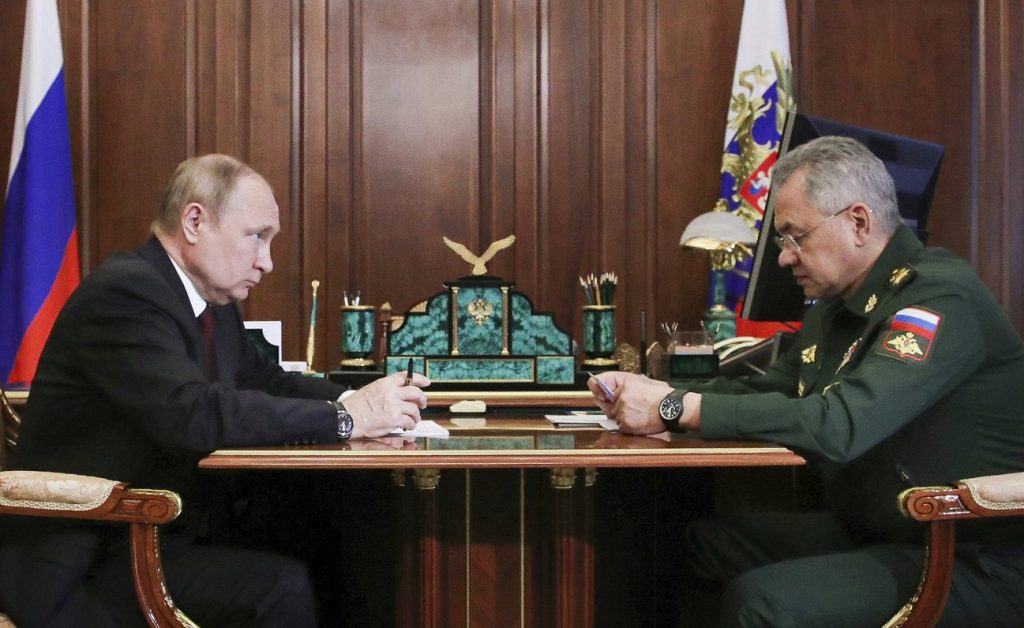
On Monday, December 25, Vladimir Putin visited St. Petersburg, where he took part in raising the naval flag on the frigate Admiral Golovko. After the official ceremony, the Russian president held a meeting with Russian Defense Minister Sergei Shoigu, during which the situation in the combat zone in Ukraine was discussed.
Key theses:
- Shoigu: “Vladimir Vladimirovich, in the course of active offensive operations, the assault troops of the Yuzhnaya group today completely liberated the village of Maryinka, which is five kilometres southwest of Donetsk. Over nine years, the Ukrainian armed forces created a powerful fortified area there, which was connected by underground passages. Every street was well-fortified and relatively well-protected from all attacks from the air and field artillery structures, long-term firing points, and a complex underground communications system. “
- Shoigu: “What is important is that we have quite significantly moved the artillery work away from Donetsk further to the west. And this allows us to protect Donetsk from attacks today more effectively.”
- Putin: “Indeed, there are at least two positive effects here. The first is that we are moving enemy combat units away from Donetsk. Secondly, by breaking into this fortified area, which the enemy has actually been building since 2014, building a significant number of reinforced concrete fortifications and communication passages there, by breaking into this fortified area, our troops can reach a wider operational area.”
- Putin: “I know that our servicemen fought with the utmost dignity and are certainly worthy of state awards. Please make suggestions for everyone you consider the most distinguished.”
It is noteworthy that the very next day, Sergei Shoigu was forced to report to Vladimir Putin about the situation in Feodosia, where the Ukrainian Armed Forces destroyed the “Novocherkassk” large landing ship.
Outcomes and outlook:
Putin demonstrates that he controls the Armed Forces and handles the situation. As Ascolta previously reported, military issues will become one of the most defining issues during Putin’s presidential campaign in 2024. The meeting with Shoigu is instead an element of this campaign, as are the trips to the headquarters of the Southern Military District in Rostov-on-Don. The essence of the meetings is not particularly important – the “image” is essential. In addition, the meeting on the frigate “Admiral Golovko” should become a signal to the West, where voices were heard about the need to transform the Baltic Sea into an internal NATO sea: Russia is not going to leave the Baltic and is ready for confrontation at sea.
- Meeting of the Supreme Eurasian Economic Council
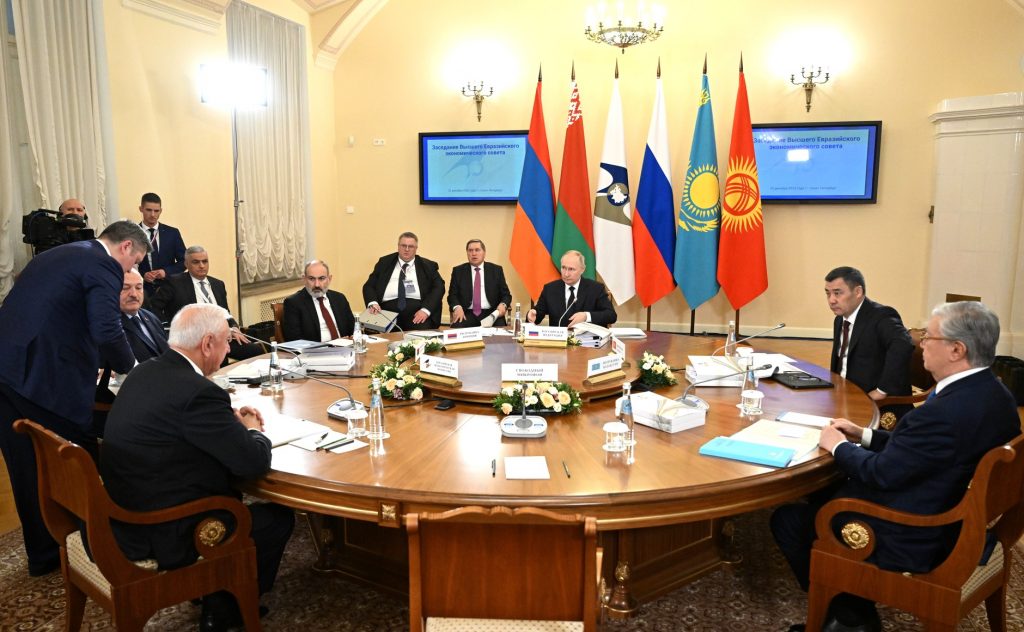
On Monday, December 25, a meeting of the Supreme Eurasian Economic Council was held in St. Petersburg. Vladimir Putin chaired the meeting. The negotiations began with a meeting in a narrow format, which was also attended by Prime Minister of Armenia Nikol Pashinyan, President of Belarus Alexander Lukashenko, President of Kazakhstan Kassym-Jomart Tokayev, President of Kyrgyzstan Sadyr Japarov and Chairman of the Board of the Eurasian Economic Commission Mikhail Myasnikovich. Further consultations continued in an expanded format.
At the meeting, the results of the work of the Supreme Euro-Asian Economic Council in the year of the Russian presidency were summed up, and promising directions for deepening integration processes were discussed.
Key theses from Putin’s closed format speech:
- “Today, we will consider several important, fundamental, I would say, issues related to the deepening of Eurasian integration. In particular, it is necessary to approve a draft declaration prepared at the initiative of the Russian side on the further development of economic processes within the framework of our association for the period until 2030 and for the future until 2045. In essence, this is a new program document that provides for specific measures to intensify joint efforts in key sectors and also identifies additional areas of interaction, such as the climate agenda, medicine, tourism and others.”
- “I would like to especially note that on the eve of our meeting, a free trade agreement was signed between the EurAsEC and Iran. This agreement can be truly significant in the context of strengthening ties between the Eurasian Union and one of the largest and most technologically advanced economies in the Eurasian region.”
- “Once the agreement comes into force, virtually all categories of goods produced in the union will have duty-free access to the vast Iranian market of 90 million people, and non-tariff barriers will be significantly reduced.”
- “In connection with the expiration of the term of office of several Eurasian Economic Community Court judges, a new body composition has also been submitted for our approval, which should begin work on January 1, 2024.”
- “Naturally, the agenda includes a range of other specific issues of economic interaction, customs and tariff regulation, investment policy, and the functioning of the common markets of the Eurasian Community. Colleagues will be able to speak out on all the issues that concern them about the activities of our Union.”
Key theses from Putin’s extended format speech:
- “Our ministers of the economic bloc, experts and specialised specialists did a good job of agreeing on the text of the declaration. The document embodies the vision of all five union countries, how Eurasian integration should develop further, fully reflects the opinions and interests of each of the Eurasian Community members and seems very good.”
- “We note with satisfaction that this year, all member countries of the association are experiencing stable economic growth. So, in Russia, in the first three quarters, GDP increased by three per cent, and by the end of the year, 3.5 per cent is expected. There is also an increase in gross product, and a very significant one, in other Eurasian Economic Union states. As far as I know, in nine months, it will be more than nine per cent in Armenia; this is a perfect indicator; in Kazakhstan – almost five. In Kyrgyzstan – more than four per cent, and in Belarus, just like in Russia – 3.5.”
- “According to available data, trade between our five countries grew by 8.9 per cent in the first nine months of this year. At the same time, its structure is improving, the supply of finished high-tech products is increasing, while the raw material component is being reduced.”
- “It is important that the share of national currencies in mutual payments exceeded 90 per cent. And this figure, without a doubt, will continue to grow in the future, taking into account the joint measures taken by our countries in the financial sector.”
- “The Islamic Republic of Iran is one of the largest economies in the Eurasian region, a technologically developed state and a key link in the southern trade route between the markets of the EAEU and the countries of the Middle East and South Asia. Therefore, strengthening ties with this country will bring obvious benefits both to all participants in our association and to the Islamic Republic of Iran itself.”
- “The Eurasian Commission is also negotiating with the United Arab Emirates and Indonesia. The formation of free trade zones with these countries will further increase the export potential of the EAEU, increase mutual supplies to the markets of friendly states, and thereby give an additional impetus to developing the union’s economies, will enlarge and diversify our common market.”
- “The work to connect integration processes through the EAEU and the Chinese One Belt, One Road initiative also brings real results.”
- “Intensive work continues to develop the unified transport system of the Eurasian Union, including the international North-South corridor.” In this sense, I return to cooperating with the Islamic Republic of Iran, which has key positions here.”
Outcomes and outlook:
Putin’s traditional New Year’s meeting with his allies was intended to summarise the year and outline plans for the coming year. The most important thing the participants could state was the growth of economic indicators for most EAEU countries (especially against the backdrop of the crisis and economic recession observed in the European Union). The main intrigue of the meeting was whether Armenian Prime Minister Nikol Pashinyan, who has a severe grudge against Russia due to the actual support of Azerbaijan in the conflict over Karabakh, would agree to go to St. Petersburg. However, if the visit had not taken place, this would have led to dire economic consequences for Armenia – especially in conditions of complete energy dependence on Russia. Thus, today, Pashinyan has sent a signal that he is ready to accept defeat and Russia’s role in this defeat. However, the question arises: for how long?
- Informal meeting of the CIS member states’ heads
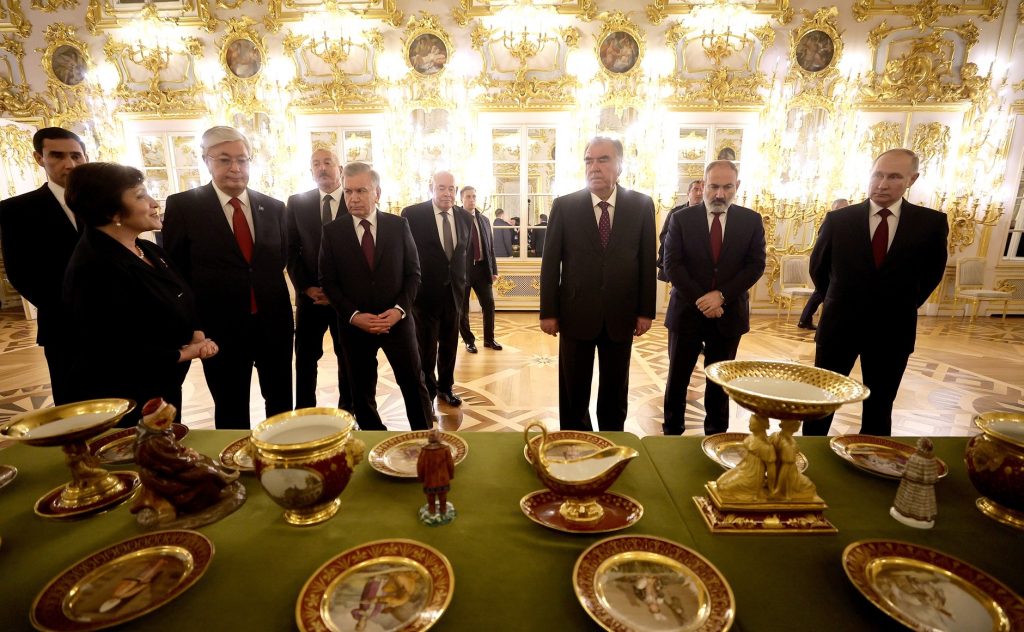
On Tuesday, December 26, an informal meeting of the leaders of the member countries of the Commonwealth of Independent States (CIS) took place at the Konstantinovsky Palace in St. Petersburg. The meeting was attended by Vladimir Putin, President of Azerbaijan Ilham Aliyev, Prime Minister of Armenia Nikol Pashinyan, President of Belarus Alexander Lukashenko, President of Kazakhstan Kassym-Jomart Tokayev, President of Kyrgyzstan Sadyr Japarov, President of Tajikistan Emomali Rahmon, President of Turkmenistan Serdar Berdimuhamedov and President of Uzbekistan Shavkat Mirziyoyev.
Before the meeting, its participants visited the Pavlovsk, Tsarskoe Selo and Peterhof museum reserves. It is also known that after the meeting, the Russian president negotiated separately with the presidents of Kazakhstan and Uzbekistan.
Putin made a speech during the informal part of the CIS member states’ heads:
- “Such meetings provide a perfect opportunity to jointly take stock of the activities of the Commonwealth of Independent States, talk about plans for the future, and, of course, discuss issues that concern us on the international agenda.”
- “It would not be an exaggeration to say that the past year was extremely active and eventful for the CIS, filled with major events and bright initiatives. This is largely the merit of our Kyrgyz friends. In this regard, I would like to thank Sadyr Nurgozhoevich Japarov for the great work done during Kyrgyzstan’s chairmanship in our organisation.”
- “Starting the New Year, the chairmanship of the CIS will pass to Russia. As I already said at the summit of the Commonwealth of Independent States in Bishkek, we plan to continue multifaceted integration activities in the spirit of continuity. Russia has already presented the concept of its chairmanship and an action plan for its implementation, which includes about 150 points.”
- “The closest cooperation of the Commonwealth members is still in demand, especially in matters of combating attempts to falsify history and glorify Nazism. Therefore, in our opinion, it is necessary to continue to carry out such already iconic events in memory of those who fell during the Great Patriotic War, such as the “Immortal Regiment”, “St. George Ribbon”, as well as the “Memory Train”.
- “Another major international event will be the World Youth Festival in Sochi from March 1 to March 7, 2024. We expect that young people from more than 180 countries will come to it, including from the countries of our Commonwealth.”
Outcomes and outlook:
Another ritual meeting, the main goal of which is to show that the CIS is alive and an effective mechanism of interstate relations in the post-Soviet space. At the same time, Putin must demonstrate that he remains influential in Central Asia. First of all, such a demonstration is important for Moscow against the background of China’s activation in this region, which can offer much more favourable conditions for cooperation and partnership. Whether Putin will be able to maintain influence on the area will become completely clear in 2023, when Russia takes over the chairmanship of the CIS.
- Meeting of Vladimir Putin and Alexey Miller
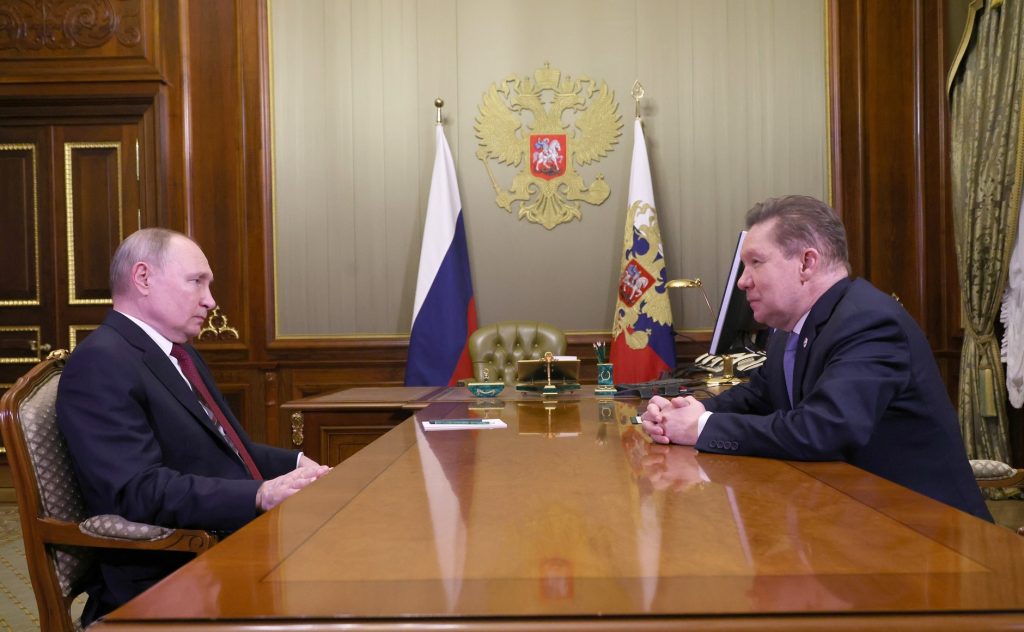
On Tuesday, December 26, Vladimir Putin met with the Board of Gazprom PJSC Chairman Alexey Miller in St. Petersburg. During the meeting, the results of the year, the situation with gas supply to Russian regions, and the main trends in the gas industry of the Russian Federation were discussed.
Key theses:
- Miller: “Gazprom reliably supplies our Russian consumers with gas in the autumn-winter period. The country has passed its first winter peak. The first half of December in Russia’s unified gas supply system turned out to be cold, and the whole week was generally characterised by abnormally cold temperatures in many regions of Russia. And it should be noted that Gazprom fully satisfied all requests, all needs.”
- Miller: “December 8 was the coldest day this winter; the average temperature in the unified gas supply system zone was minus 17 degrees. In many regions, truly anomalous temperatures were observed because minus 17 is the average temperature. It was very cold on the middle Volga; it was freezing, in particular in St. Petersburg, especially in the first ten days.”
- Miller: “Frosts also came to Uzbekistan in December, and our Uzbek friends and colleagues asked to increase gas supplies to Uzbekistan in a volume that doubled our daily obligations under the signed contract. In December, we currently supply Uzbekistan with the maximum technically possible volume of gas that can be provided via the Central Asia–Centre gas pipeline.
- Miller: “On December 23, Vladimir Vladimirovich, we set a historical record for daily gas supplies to China, the largest volumes. We are also now supplying China daily with volumes that are higher than our contractual obligations. This year, gas supplies to China will be one and a half times more than in 2022. And in 2025, we will already meet our contractual obligations: in 2025, gas supplies to China will amount to 38 billion cubic meters.”
- Miller: “As for all your instructions on gasification, gas supply to the constituent entities of the Russian Federation, as regards the additional gasification program, I am ready to report that in 2023, we completed the volume of work 50 per cent more than in 2022. This is what pre-gasification is all about.”
Outcomes and outlook:
Russia continues to consider gas as the main instrument of influence in interstate relations (recently, competition has begun to be noted with another project – the “nuclear diplomacy” of Sergei Kiriyenko, who has made nuclear power plants an article of Russian export and influence in the world). Obviously, on the eve of the New Year, the meeting with Alexey Miller was intended to sum up the results and outline plans for the production and transportation of gas abroad. In this regard, gas must become one of the most critical arguments in Russia’s relations with China, Central Asian states and, to a lesser extent, India. It will also make it possible to build its doctrine regarding pressure on the European Union, where, according to German Chancellor Olaf Scholz, gas prices increased tenfold after terminating contracts with Russia. It is quite possible that Russia will use the “gas stimulus” principle next year to provoke a de facto split in the European Union.
- Meeting of the State Council of the Russian Federation
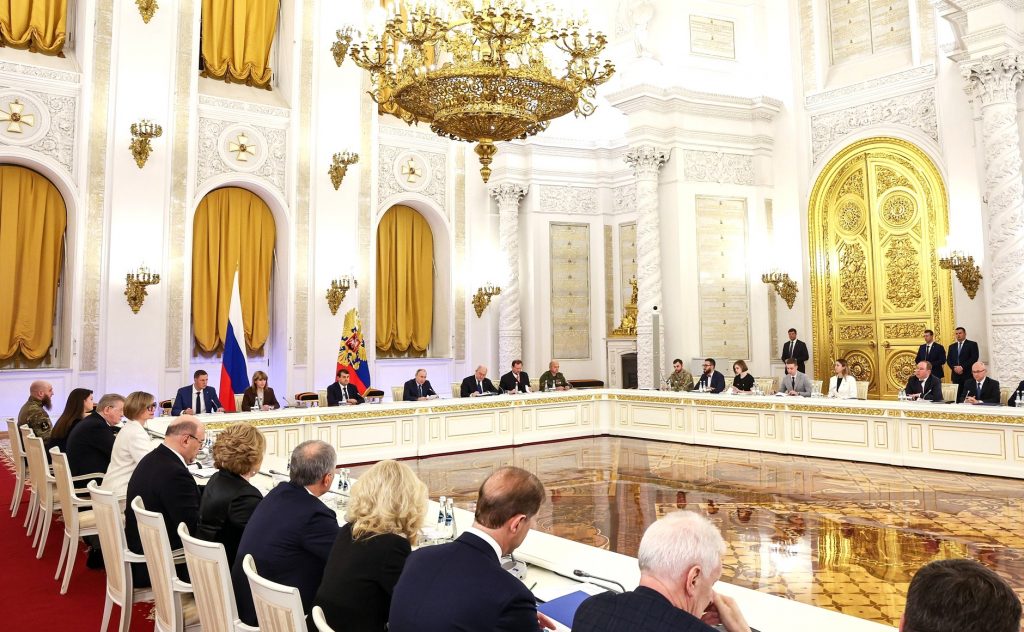
On Wednesday, December 27, Vladimir Putin chaired a meeting of the State Council of the Russian Federation, which took place in the Grand Kremlin Palace. The main topic of the meeting was “Increasing the role and prestige of the teacher and mentor.” Also, the Russian President made a speech on the meeting topic, in which he voiced the main theses and positions regarding mentoring and the importance of this factor in the development of the state.
Key theses:
- “Such a high, noble meaning of mentoring is reflected in the work of our regions, enterprises, universities, and healthcare institutions that take patronage and help their colleagues from Donbas and Novorossia.”
- “Education, a modest matter in appearance, is simultaneously one of the greatest affairs in history” – these words belong to the great Russian teacher Konstantin Dmitrievich Ushinsky. He wrote a lot about mentors’ role in shaping the younger generation’s worldview. Today, we are returning to these traditions, taking all the best that the pre-revolutionary and Soviet education systems were proud of.”
- “What do I consider extremely important? We need to carefully look at how all the measures we are taking and planning are being implemented on the ground. Teachers and the parent community look for effective solutions to existing problems. The point again is to remove non-core workload from teachers, clearly outline the responsibilities of class teachers, attract and retain young, energetic, creative people, graduates of specialised universities, in the education system.”
- “Teacher work must be paid according to uniform, clear and transparent rules; otherwise, a gap in the quality of education will accumulate between regions, and the shortage of teaching staff will grow. Clearly, they pay less, people move from there, and the quality of teaching ultimately suffers. All this violates the key principle of equal educational opportunities for our children. We must never forget this.”
- “For every person, an experienced mentor is an opportunity to improve their competencies, solve more complex problems, and therefore qualify for higher wages. In this sense, mentoring is the most important factor in creating an economy of high wages and improving the well-being of our citizens and Russian families.”
- “It is imperative to facilitate the exchange of experience between organisations, companies and entire regions. To collect and disseminate best practices, I propose creating a platform for developing the mentoring movement at the Mashuk educational centre. Involve in its work both lecturers from the Knowledge Society and winners of projects from the Russia – Land of Opportunities platform.”
Outcomes and outlook:
On the eve of the presidential elections, the Russian government is trying to show that it cares about teachers and their well-being. Caring for teachers (and also, one should expect, for medical workers) will become one of the foundations of Putin’s social program during the election campaign. In this way, Putin is trying to turn teachers into unofficial agitators, giving them an additional incentive. As practice shows, teachers are already used as agitators for the government and its projects in any election campaign.
- Meeting with the Minister of External Affairs of India Subramaniam Jaishankar
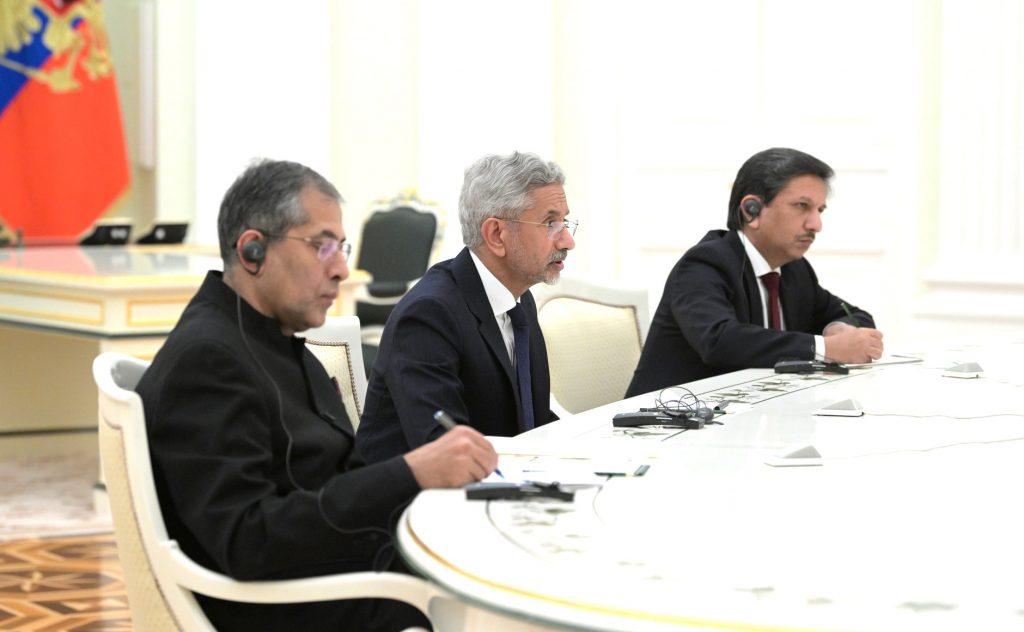
On Wednesday, December 27, Vladimir Putin met with Indian Foreign Minister Subramaniam Jaishankar. During the open part of the meeting, the parties discussed economic relations between the two states and possible ways to strengthen cooperation. From the Russian side, the meeting was also attended by Foreign Minister Sergei Lavrov, Deputy Prime Minister – Minister of Industry and Trade Denis Manturov, as well as Presidential Aide Yuri Ushakov.
Key theses:
- Putin: “Our trade turnover is steadily growing for the second year in a row. This year, the pace is even greater than last year. If last year I don’t remember what percentage there was, then here already in nine months of this year, we have exceeded the entire volume of growth [of trade turnover] last year. Everyone knows this well: these are, of course, energy resources, first of all, oil, petroleum products, coal, but not only. We work in high-tech areas, and we are very pleased to note that, despite all the turbulence happening in the world, relations with our traditional friends in Asia, with India, with the Indian people, are developing progressively.”
- Putin: “We know the position of Prime Minister Modi and have spoken about this many times regarding his attitude towards complex processes, including hot spots, the situation in Ukraine. I have repeatedly informed him about the situation surrounding this conflict. I know his desire to do everything to resolve this problem peacefully. Now we will talk about this in more detail and inform you further. I know my colleagues have probably already said this. However, we will further inform you about this situation.”
- Jaishankar: “Of course, Mr. President, he [Indian Prime Minister Narendra Modi] wants to visit Russia next year. I am confident that we will find a suitable date that will be convenient for both parties from the point of view of their political calendar. Of course, he looks forward to the opportunity to communicate with you. I would also like, Your Excellency, to take this opportunity to share with you some aspects of the progress that we have been able to make.”
- Jaishankar: “I would also like to place special emphasis on progress in trade: more than $50 billion in trade turnover today. And we believe that these are only the first steps in unlocking our potential. It is vital to make our trade interaction more sustainable; we need to think about how to achieve this.”
- Jaishankar: “The second aspect is cooperation in the nuclear sphere. Yesterday we signed an agreement that will allow us to further develop the Kudankulam NPP project.”
Outcomes and outlook:
Russia today pays special attention to relations with India, realising that the most populous state in the world is the most significant potential ally of the Russian Federation. Relations with India make it possible to partially balance ties with China and not become utterly dependent on Beijing. India is the key to Central Asia and the Indian Ocean region and a possible mediator in negotiations with Washington (if such a need arises) since Prime Minister Modi gets the same handshake in Moscow and Washington. The meeting with the Indian Foreign Minister is also important regarding the future expansion of BRICS and Russia’s chairmanship in this organisation in 2024. The announcement of Narendra Modi’s visit to Moscow is an essential message that will be received ambiguously in the West.
- Meeting of Vladimir Putin and Sergei Chemezov
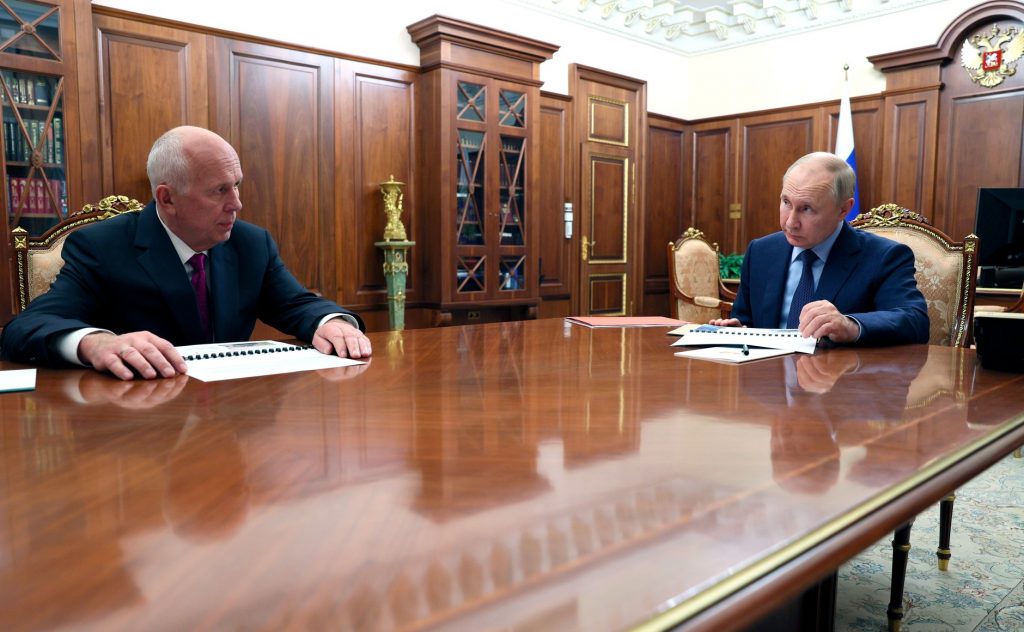
On Thursday, December 28, Vladimir Putin held a working meeting with the General Director of the Rostec state corporation, Sergei Chemezov. The main issue discussed during the meeting was the country’s transition to a military footing and the further implementation of all government orders in the defence field. Putin and Chemezov also discussed further trends in this direction and touched upon technical production for the civilian sector and foreign markets.
Key theses:
- Chemezov: “Artillery, armoured vehicles, tanks, combat aircraft, small arms, drones, ammunition, and so on are regularly sent to the troops. Honestly, if we had not carried out a global modernisation of our enterprises by 2022, I think the increase in production by several times, which occurred last year and this year, is unlikely; we would probably be able to accomplish this.”
- Chemezov: “Nevertheless, despite the [so-called] “SMO”, we still do not forget about the production of civilian products. Our main civil projects are, of course, the production of civil aircraft for civil aviation. And this is exactly what we pay a lot of attention to. And according to the program that you approved, by 2030, we must produce more than 500 aircraft of various types: 270 MS-21 airliners, 142 Superjet-100 aircraft and 115 Tu-214 aircraft.”
- Chemezov: “As for engine building, we have already discussed the PD-8; we plan to obtain a certificate for the VK-650V engine in 2024. This is a helicopter engine; it will be installed on Ansat and the Ka-226. There are foreign engines today, but in 2024, I hope we will have completed all the tests and received certification.”
- Chemezov: “In 2024, we will complete the second stage of certification of the so-called offshore helicopter. We did this at the request of Rosneft. The helicopter will be used to service offshore platforms. In addition, it can land and make the necessary forced landing. It can land directly on the water, where a rubber ring is inflated around it. And it can sit on the sand. We showed it in Abu Dhabi at an exhibition, and there was great interest. The Malaysians have shown interest and want to buy, and the Arab countries too.”
- Chemezov: “In the automotive industry, our enterprises are actively involved in producing electric vehicles. Kamaz already has six vehicles on the Moscow-St. Petersburg highway. In 2024, we will launch 18, and will be 18 cars already in service. We will launch the same quarry-type drone in 2024. That is, a huge dump truck, but without a cabin, without anything, it will independently transport rock, rock mass, and so on.”
- Chemezov: “We replaced 2,300 components during the year, which we learned to make ourselves. And today, the car that was made with the Germans, the K5, is already localised by about 75–80 per cent, and next year, we will completely replace everything, 100 per cent.”
- Chemezov: “As for medicine and medical instrumentation, we already have 150 types of medical equipment and equipment registered with Roszdravnadzor. This equipment is made, among other things, by our enterprises: Shvabe, Ruselectronics, and the Radioelectronic Technologies holding.”
Outcomes and outlook:
Sergei Chemezov remains among the most influential Russian political and economic people. At the same time, he enters into confrontation with several individuals in the “Kremlin Politburo” – especially with the Kovalchuk and Sechin groups. Chemezov has been a personal friend of Putin since Dresden times. He is responsible for the military-industrial complex (the development of which Putin has no comments on). We can say that Putin, with his public meeting with Chemezov, is sending a signal to the elites: he will not allow intra-elite struggles and wars between the “Kremlin towers”. He will also be a “spreader” in processes within the elites.
- Interview with Sergei Lavrov for Russian media
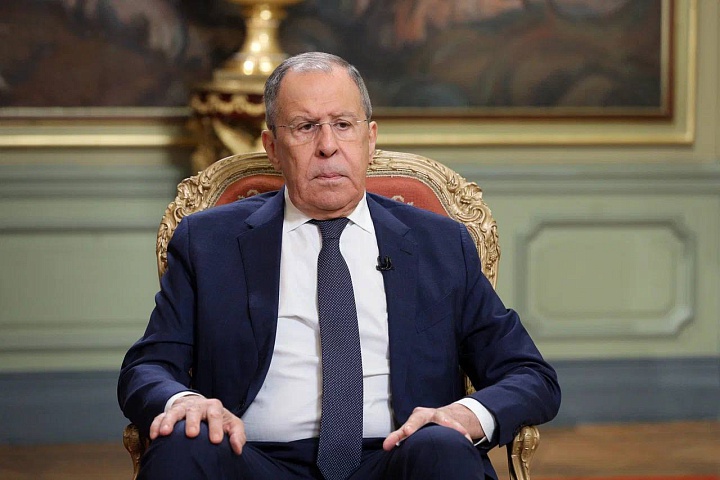
In the last days of the outgoing year, Russian Foreign Minister Sergei Lavrov gave several interviews with leading Russian media (TASS, RIA Novosti, Rossiya Segodnya, Rossiya 24), in which he summed up the results of the year and outlined the main trends and plans for 2024. Below, we present the main points from all interviews at once since their essence and meanings are intertwined.
Key theses:
- “Personally, we don’t discuss anything behind the scenes; we always work openly. It’s time for everyone to learn a lesson from the consequences of US attempts to play behind-the-scenes diplomacy in the Middle East. Washington’s line of monopolising mediation efforts and undermining the international legal framework for the settlement led to the current escalation in the conflict zone.”
- “Despite the failure of the “counter-offensive” of the Ukrainian Armed Forces, the West continues to pump Kyiv with weapons, raising the stakes by using increasingly lethal and long-range systems in the Ukrainian conflict. NATO weapons are being supplied, including cluster munitions and depleted uranium shells.”
- “The tragic events in the Middle East for some time displaced the Ukrainian crisis from the front pages of Western media. However, for most unfriendly governments, “dealing a strategic defeat to Russia on the battlefield” is still listed as a priority. Neither Washington nor Brussels refuses to assist the Kyiv regime, realising that without it, it is doomed. They still have a vested interest in holding back Russia with the hands and bodies of Ukrainians.”
- “The situation in the field of arms control is deteriorating due to the destabilising policies and specific destructive actions of the United States. At the same time, the Americans are deliberately increasing tensions in the field of international security. These processes are inextricably linked with each other; one feeds the other and vice versa.”
- “Washington’s logic is simple. The pillars that ensured US dominance are disappearing from under our feet. Largely due to the Americans’ mistakes, who believed in their “exceptionalism,” infallibility and impunity. In an attempt to slow down the loss of the hegemonic position, they relied on force. Hence the pursuit of military superiority and the desire to ensure freedom of hands in using force. This is precisely what explains the rejection of restrictions in the field of arms control and other instruments designed to ensure a strategic balance of interests of participants in international processes.”
- “As for the prospects for dialogue with the United States on New START and an agreement on something to replace it, we made it clear that dialogue is impossible without Washington abandoning its anti-Russian course. “The inadequacy of American ideas about launching negotiations on nuclear arms control, separating them from the negative military-political context and the depressing state of affairs in Russia-West relations, is obvious to us.”
- “The Armenia of our day has been and remains a strategic partner in the South Caucasus. We are convinced that all difficulties are temporary and will be overcome if there is political will. The sustainable and systematic development of Russian-Armenian ties meets the fundamental interests of the peoples of our two states, who have common values and a common cultural code.”
- “Remember the NATO bombing of Yugoslavia, the invasion of Iraq under the false pretext of the presence of weapons of mass destruction there, the collapse of Libyan statehood, the intervention in Syria. This includes the outbreak of an armed conflict in Eastern Europe through the expansion of NATO and the transformation of Ukraine into an anti-Russian springboard. The most recent is the aggravation of the situation in the Palestinian-Israeli conflict zone. Conflict sites also exist in other regions. You mentioned Africa, but there is also Afghanistan and the Korean Peninsula. The Americans openly encourage separatist tendencies in Taiwan, in defiance of repeated warnings from Beijing that this runs counter to the fundamental interests of the PRC.”
- “US President Obama spoke back in 2015 about tearing our economy “to shreds.” Now they are seeing the opposite effect of their policies on the weakening and even “dismemberment” of Russia. Many idle “pique vests” abroad began to talk about this too.”
- “The vast majority of states, the Global Majority, have not joined the sanctions but have not yet been able to raise their voice in the discussions truly. But there is an emerging realisation that this can happen to anyone and that any country can become the target of American, European and other allies of Washington’s sanctions. Nobody knows what America won’t like the next morning. In recent years, the United States did not like that Ukraine was a neighbour of Russia, which sought to build normal working relations with its neighbours. They began to “drag” her into the European Union under the slogan “either with us or with Russia.” This “either/or” will not go away.”
- “Brazilian President Lula da Silva proposed considering alternative means of payment for all of Latin America. But in addition to this regional initiative, he has a global proposal. It is being developed in BRICS. By the next summit in October 2024 in Kazan, the ministries of finance and central banks must submit such a proposal.”
- “We understand that our Chinese friends have a trade turnover with the United States and the European Union that is tens of times greater than that of the Russian Federation. But it is decreasing, while our trade turnover with China has increased by almost 30%. Exceeded the $200 billion mark ahead of schedule (now it’s already around $230 billion). By the end of the year, statisticians will have more final results.”
- “I want to say the following. China beat the United States on its “field”, based on the globalisation norms introduced by the United States and which the Chinese began to use. We worked on these principles after the Soviet Union disappeared; everyone thought an era of universal prosperity had arrived, and everyone was “a friend, comrade and brother to man.”
- “Americans are very cynical. They have developed a psychology that is sometimes called “insular” like Britain. Even the British are the basis of the people who migrated to America. They “cleansed” it of the indigenous population and drove its remnants into some reservations. This island mentality is reinforced by the fact that there are no serious security threats around except those they create for themselves.”
- “The investigation into the crimes of the “Kyiv regime” is already underway. Russian law enforcement agencies carefully record and document the atrocities committed by Ukrainian neo-Nazis, not limiting themselves to the period of the [so-called] “special military operation.” The suffering of the civilian population of Donbas began much earlier, back in 2014. Those responsible will also be brought to justice.”
- “Our readiness to restore a full dialogue with the United States should not be taken for granted. Russian-American relations have “thinned” to the limit due to the fault of Washington, which has doctrinally formalised the task of inflicting a “strategic defeat” on Russia. Although the White House is still wary of destroying everything that remains of the relationship to the ground, Americans are not ready to conduct an honest dialogue based on mutual respect and consideration of each other’s interests.”
Outcomes and outlook:
Russian Foreign Minister Sergei Lavrov gave an extensive interview, which, on the one hand, looks like political information and, on the other, like a farewell chord: most likely, after the presidential elections, Lavrov, like several other politicians around Putin, will have to resign. Russia is in for a radical renewal, as expected. That is why the interview is not only a summary of the year but also touches in broad strokes the entire architecture of international relations with Russia’s participation built over the past twenty years.
- Shelling of Belgorod
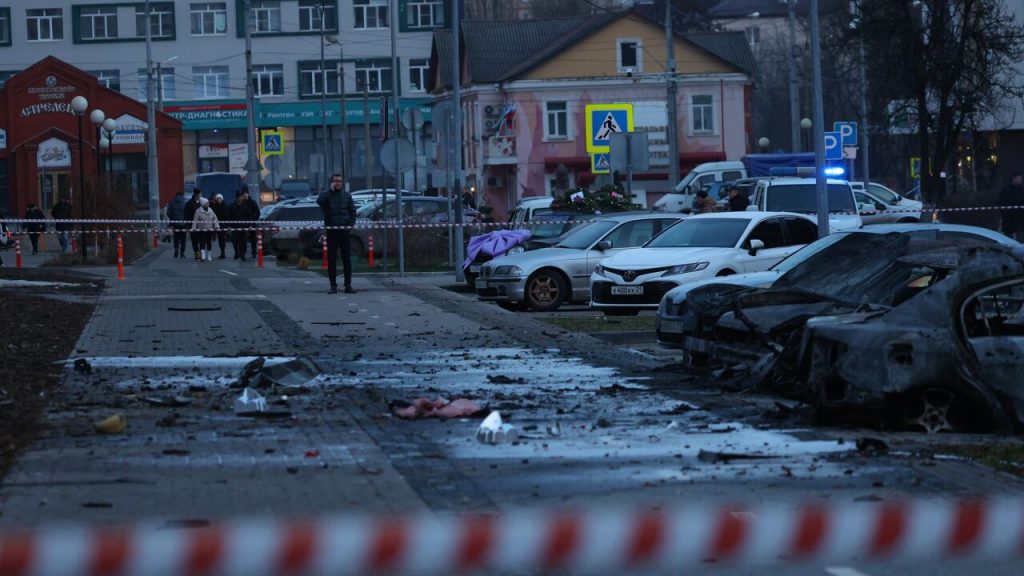
On Saturday, December 30, the regional centre of the Belgorod region, located 40 kilometres from the border with Ukraine, was hit by several missiles launched from the territory of the Kharkiv region. According to official data, 14 people were killed as a result of the shelling, including two children. Another 108 people were injured. In turn, the Ukrainian side stated that the missiles were launched at strategic and military targets. However, several missiles, including the ice skating rink, hit the city center. Sometime after the shelling, Putin reported about the situation in Belgorod. Secretary of the General Council of the United Russia Party Andrei Turchak called such actions of the Armed Forces of Ukraine a terrorist attack.
Also, Russia requested a meeting of the UN Security Council, stating that Western-made missiles, including Czech ones, carried out the shelling of Belgorod. In turn, the Czech Republic refused to participate in the meeting. Also, representatives of France stated that if Russia had not attacked Ukraine, there would have been no need to convene such a meeting.
On December 31, several regions of the Russian Federation abandoned New Year’s fireworks and celebrations due to the situation in Belgorod. Also, the Russian Ministry of Defense stated that the missile attack on Kharkiv, which was carried out several hours after the shelling of Belgorod, was carried out for retaliation and was aimed at eliminating representatives of the Main Intelligence Directorate of the Moscow Region, as well as foreign instructors.
Outcomes and outlook:
The shelling of Belgorod raises many questions. There is still no real evidence that this attack was the work of Ukraine. It did not provide any strategic advantages and was not aimed at military targets. In many ways, there is a signature of “provocativeness” that we observed in 1999–2001 during the bombings of houses in the Russian Federation (the explosions themselves preceded the Second Chechen War). But immediately after the explosions, Russia tried to show itself in the eyes of the world community as a victim – hence the accusations against Great Britain for orchestrating the tragedy and the Czech Republic – that Czech-made weapons were involved in the shelling. This was followed by massive shelling of Ukrainian territory; Russia convened a meeting of the UN Security Council. It can be predicted that such actions will not be isolated, and before the elections in Russia, from time to time, there will be reminders of the “atrocities of the terrorist regime in Kyiv” and that the [so-called] “SMO must be carried to the end.”
- New Year’s greetings from Vladimir Putin
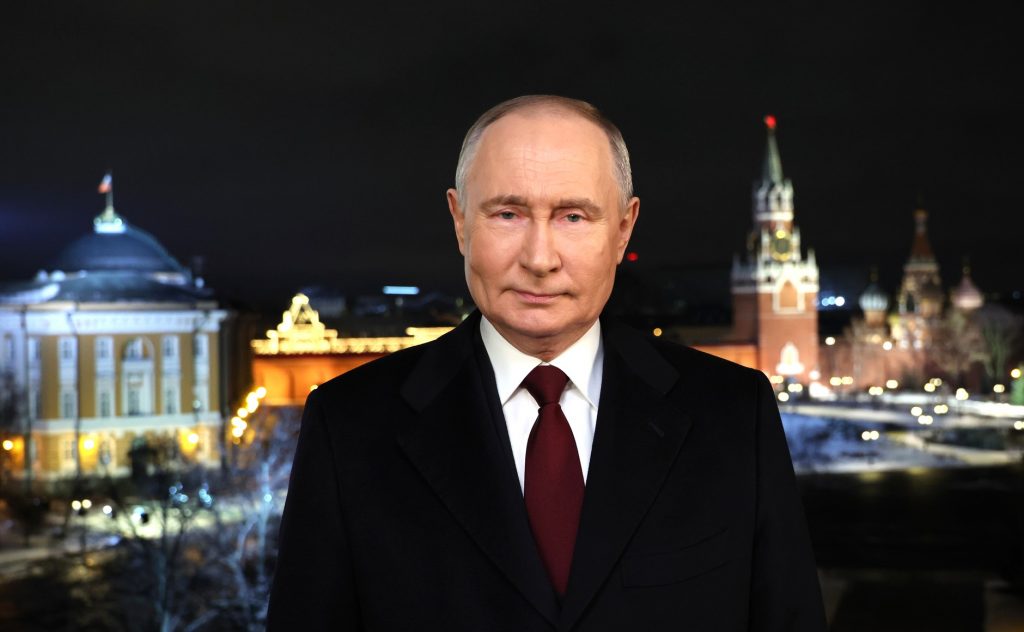
On the night of December 31 to January 1, Vladimir Putin made a traditional address to the citizens of the Russian Federation, in which he summed up the year’s overall results and congratulated everyone on the upcoming new year. For Putin, this congratulation was the twenty-second. It is noteworthy that, unlike the previous New Year’s greetings, the Russian president preferred the classic background of the Kremlin (last year, he recorded the greeting in the company of military personnel). Putin’s rhetoric has also changed, although it cannot be called peaceful.
Key theses:
- “In the past year, we worked hard and accomplished a lot. We were proud of our common achievements and rejoiced at our successes. And they were firm, defending national interests, our freedom and security, our values, which were and remain an unshakable support for us.”
- “Working for the common good has brought society together. We are united in our thoughts, in work and battle, on weekdays and holidays, showing the most important features of the people of Russia – solidarity, mercy, perseverance.”
- “Today, I would like to appeal to our military personnel – to everyone at a combat post, at the forefront of the fight for truth and justice. You are our heroes. Our hearts are with you. We are proud of you and admire your courage.”
- “We have proven more than once that we can solve the most difficult problems and will never retreat because there is no force that can divide us, make us forget the memory and faith of our fathers, and stop our development.”
- “The coming year 2024 has been declared the Year of the Family in our country. And a real big family is, of course, one where children grow up, where attention, warmth and care for parents, love and respect for each other reign.”
- “We are one country, one big family. We will ensure the confident development of the Fatherland and the well-being of our citizens, and we will become even stronger. We are together. And this is the most reliable guarantee of the future of Russia.”
Outcomes and outlook:
Putin’s speech was routine and without any special frills. The main emphasis is on the need for unity (the main thesis of recent years) and on the fact that next year in Russia has been declared the Year of the Family (devotion to traditional values that should distinguish Russia from Western civilisation is emphasised). But overall, the speech is too pathetic, without the effect of “touching the heartstrings”, one of Putin’s weakest speeches during his presidency.
- Vladimir Putin’s visit to a military hospital and meeting with military personnel
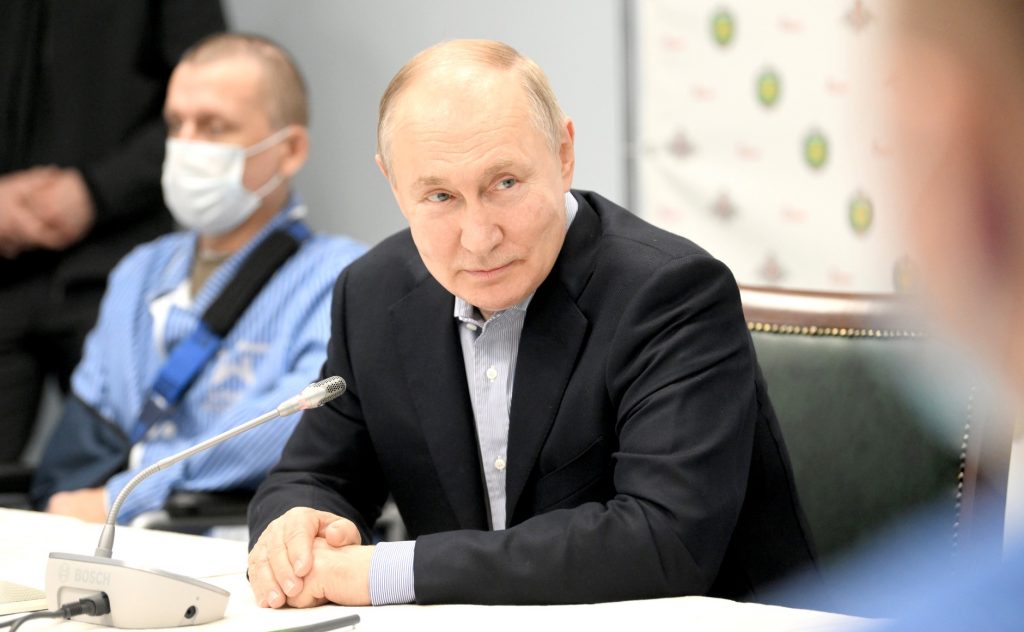
On Monday, January 1, Vladimir Putin visited the Vishnevsky Central Military Clinical Hospital, where he met with military personnel who were wounded during hostilities in Ukraine. The event itself was held in the best traditions of propaganda, demonstrating high support for the authorities among military personnel. Putin also inspected the hospital itself and became familiar with its technical capabilities.
Key theses:
- “This is one of the best medical institutions of the Ministry of Defense. Not everyone is so equipped; not everyone is so brilliant. But gradually, the department will bring everything in accordance with this level and with this level of quality.”
- “Ukraine itself is not an enemy for us. But those who want to destroy Russian statehood, those who want to achieve, as they say, the strategic defeat of Russia on the battlefield, are mainly in the West, and even then, there are different people there. Some people sympathise with us and who are with us in spirit. But there are so-called elites for whom the existence of Russia – at least in its current quality and its current size – is, as they think, unacceptable. They want to fragment.”
- “You probably see on the battlefield that they are gradually being blown away.” When a projectile flies, it is difficult to understand whether they are “deflated” or not, but in general, you probably know that the situation on the battlefield is changing. This is although the entire so-called civilised West is fighting us.”
- “You, too, have probably heard many times: the Ukrainian army spends five or even six thousand 155-calibre shells there per day of combat operations, and the United States produces 14 [thousand] per month – per month! And they spend five thousand per day. Yes, now they plan to increase it during 2024, but they also produced 14–15 and will produce up to 20 [thousands]. But if you spend five thousand a day, depletion occurs quickly. It’s coming now. And we are increasing and will continue to increase, and in multiples. They were supplied with more than 400 tanks – 450 or whatever it is- and we will produce and overhaul 1600 in a year. This is not a state secret; there will probably be more. And so on for almost every position. Therefore, even though they have set such a task from time immemorial – to deal with Russia, we will deal with them faster, it seems.”
- “The point is not that we don’t like what they supply to Ukraine; that’s not the essence of the problem. The essence of the problem is not in Ukraine but in those who, through the hands of Ukraine, are trying to destroy Russia. That’s the problem. But they won’t succeed; it’s simply out of the question, absolutely out of the question.”
- “What just happened in Belgorod is, of course, a terrorist act. Why? Because under the cover of two missiles—Alder, in my opinion—what did they do? They fired from multiple launch rocket systems and MLRS. As military people, you know what MLRS is. This weapon is indiscriminate and hits areas. And with these weapons, they struck right at the centre of the city, where people were walking before the New Year. Just a strike, a targeted strike on the civilian population. Of course, this is a terrorist attack; there’s no other way to call it.”
- “We are hitting with high-precision weapons at the places where they make decisions, at places where military personnel, mercenaries gather, at other centres of this kind, at military facilities, first of all. And they are quite sensitive, these blows. That’s what we’ll do. You probably noticed that the next day, such attacks were carried out. And today, in my opinion, they are applied, and tomorrow we will do it.”
- “I’ve already said it; I can repeat it, but you feel it yourself. Our Armed Forces are becoming so capable and ready to use modern warfare, as no other army in the world is ready or able to do.”
Outcomes and outlook:
Putin continues to use the militaristic theme. In this case, he needs to show voters that he knows about the fate of wounded soldiers and is ready to contribute in every possible way to military medicine. One of the election tricks. It is noteworthy that it was this platform that Putin chose to comment on the situation in Belgorod: against the backdrop of wounded servicemen, statements that Russia does not consider Ukraine, an enemy form a very diverse picture for the domestic consumer, the primary purpose of which is to demonstrate the unconditional truth, for which they allegedly Russia is fighting on the territory of Ukraine.
- The beginning of Russia’s chairmanship in some international organisations
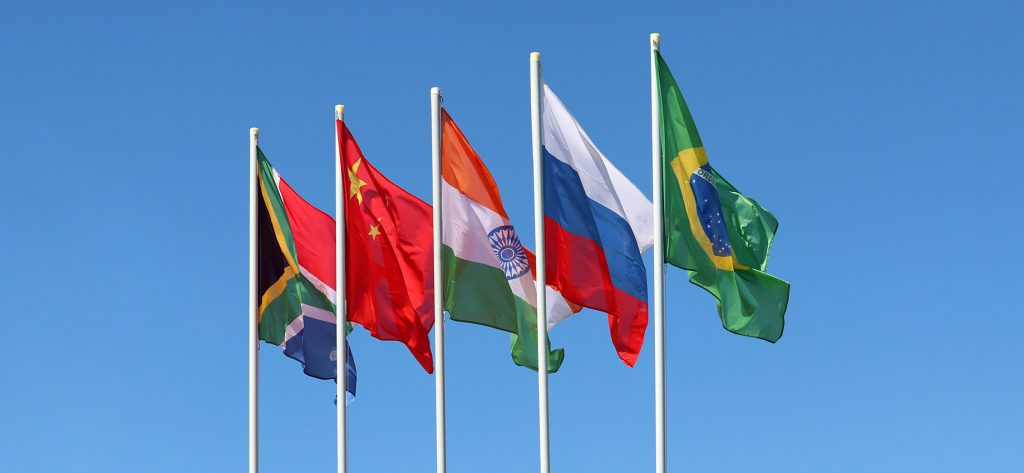
Starting January 1, 2024, Russia takes over the Commonwealth of Independent States presidency, which will last until the end of the year. According to the previously published concept of the Russian Federation’s chairmanship in the CIS, Moscow’s main goals will be increasing the organisation’s authority and strengthening its position in the international arena. One of the main aspects should be the deepening of economic integration, including in the context of creating a single economic space, interaction in the field of energy, industrial and agro-industrial cooperation, digitalisation, transport and communications, ecology and climate protection, scientific, technical and innovative cooperation.
Also, from January 1, 2024, Russia begins its chairmanship of BRICS. It is important to note that on the same day, the organisation officially expanded to 10 members, including Egypt, Iran, the United Arab Emirates, Saudi Arabia and Ethiopia. Among the priorities voiced by Moscow during its chairmanship of BRICS is further promotion of interaction in the fields of science, high technology, healthcare, and ecology, as well as in the fields of culture, sports, youth exchanges and through the civil community.
Outcomes and outlook:
Russia will try to make the most of its chairmanship in several international organisations – especially to show its importance and increase the number of international contacts. This is necessary to break the established stereotype that Russia is in international isolation and that Putin does not shake hands as a leader. It can be assumed that the main goal of the CIS chairmanship will be an attempt to demonstrate Russia’s influence on the post-Soviet space. First of all, the states of Central Asia. As for BRICS, Russia’s chairmanship in this organisation will be aimed at strengthening its position as one of the key players in the “Global South,” which is increasingly emerging as a counterweight to the Western system of geopolitical coordinates.

